If you’re shopping for CoQ10 supplements, you may come across the term ubiquinol, an ingredient in many CoQ10 supplements.
Some CoQ10 supplements also contain ubiquinone, adding to the mystery of how to choose the best supplement.
Fortunately, a basic understanding of CoQ10 forms and benefits will solve this mystery fast!
What is Coenzyme Q10 (CoQ10)?
Coenzyme Q10, also known as CoQ10 or ubiquinone, was discovered in the 1950s and is a fat-soluble, vitamin-like antioxidant found in every cell in your body.
The name ubiquinone” hints at its ubiquitousness and breadth of function throughout the body.
CoQ10 is essential for various biological functions, including converting nutrients into energy within the mitochondria, or powerhouse, of the cells.
It’s also essential for heart health and various metabolic functions, including essential fatty acid and cholesterol metabolism, brain health, blood sugar balance, muscular function, and controlling inflammation.
CoQ10 is mostly produced by the body (endogenously), but it can also be found in meats, seafood, eggs, some nuts, seeds and oils, spinach, and whole grains.
So, if our bodies produce CoQ10, why bother supplementing?
Unfortunately, CoQ10 levels decline as we age, making supplementation beneficial for some people.
CoQ10 levels may also be low in people with certain pre-existing conditions such as:
- Heart disease
- Diabetes
- Cancer
- Neurodegenerative conditions
- Autoimmune disease
- And for those with genetic variations that hinder production
CoQ10 is found in two forms:
- Ubiquinone: the inactive or oxidized form
- Ubiquinol: the active or reduced form
We’ll discuss the differences and benefits of these forms in subsequent sections.
Health Benefits Of CoQ10/Ubiquinol
Since CoQ10’s discovery in the 1950s much research has been done on the benefits of supplementation, primarily for heart health.
Studies suggest CoQ10 supplementation may help support:
- Antioxidant levels
- Blood sugar balance
- Cardiovascular function
- Cellular health
- Collagen production and skin health
- Energy levels
- Exercise recovery and performance
- Inflammatory response
- Metabolic function
- Neurological function
- Reproductive function
Many doctors, cardiologists, and healthcare practitioners recommend CoQ10 supplementation as a staple for healthy aging and longevity.
What is Ubiquinol?
Ubiquinol is the active or reduced form of CoQ10, meaning it has two extra hydrogen atoms.
It was brought to market in 2006 and marketed as a more absorbable form of CoQ10, though there is not substantial evidence to support this claim.
Ubiquinol acts as a powerful antioxidant throughout the body, and helps recycle ubiquinone as well as vitamins C and E.
Ubiquinol is less stable than the other form of CoQ10, ubiquinone, and due to its recent discovery, it’s also the less studied form. It’s also more expensive.
Ubiquinol is a common ingredient in CoQ10 supplements.
What is Ubiquinone?
Ubiquinone is the OG” CoQ10 antioxidant discovered in the 1950s.
It is the oxidized or inactive form of CoQ10, meaning the body must convert it into ubiquinol.
This is similar to the bodily process of converting beta-carotene from red and orange vegetables, into active vitamin A.
Ubiquinone is the most common form of CoQ10 found in dietary supplements and skin care products, the most studied, the most stable, and is less expensive than ubiquinol.
Ubiquinone is mostly found in the inner membrane of the mitochondria where it’s used to produce energy or ATP within the cells.
Ubiquinol vs. Ubiquinone: What is The Best Form to Take?
Ubiquinol and ubiquinone both have essential functions within the body and they’re both readily available as supplements.
So, which one is best?
Although conflicting opinions abound, the truth is the body converts both ubiquinol and ubiquinone back and forth as needed.
This is likely why there isn’t enough evidence to confirm that ubiquinone or ubiquinol is superior, and studies show both forms can raise CoQ10 levels.
Both forms are body-identical, meaning the body produces ubiquinol and ubiquinone at various stages of the assimilation process.
So, you could take either form of CoQ10 and your body will convert it into the other form and even back again, as needed for various functions.
Some healthcare practitioners prefer one form over the other, but most will tell you the form doesn’t matter as much as how much you’re absorbing. Which brings us to our next point.
Since CoQ10 is a fat-soluble antioxidant, its absorption is enhanced in the presence of fats and fat-soluble vitamins, such as vitamin E.
This is why Country Life’s CoQ10 supplements contain Kaneka® Ubiquinone, one of the most-studied and absorbable forms of CoQ10 in a base of medium-chain triglycerides (MCT).
Our MaxiSorb Mega CoQ10 also contains fat-soluble vitamin E in our Maxi-Sorb Q-Gel® delivery system, which improves CoQ10 absorption three times more than standard softgel capsule forms.
Ultimately, the body can and will use both forms of CoQ10, and both are generally safe and effective to take (but check with your doctor or healthcare practitioner first).
The best form is the one that is best absorbed. Individual biological factors, the presence of fats, and the delivery system play a critical role in this process.
Eating healthy fats with your CoQ10 supplement is another way to help enhance absorption of any form.
Finally, if cost is a factor, ubiquinone is generally less expensive than ubiquinol.
Food Sources of CoQ10
Unlike essential nutrients, which must be obtained from foods and beverages, most CoQ10—ubiquinol and ubiquinone—is made within the body.
Some foods contain CoQ10, like fatty fish, meats, nuts, spinach, seeds, and whole grains.
However, supplementation is generally the best approach to increase your CoQ10 levels.
Talk to your doctor or healthcare practitioner for individual recommendations.
Shop Country Life’s CoQ10 Supplements
Country Life has been producing high-quality CoQ10 supplements in our Certified Gluten-Free, Certified Organic, cGMP facilities for decades.
For optimal absorbability, affordability, and efficacy, we use one of the most-studied forms of CoQ10, Kaneka’s ubiquinone, which is made in a base of medium chain triglycerides (MCT) to maximize absorption and assimilation.
Our CoQ10 offerings include:
- MaxiSorb Mega CoQ10: 100 mg of ultra-absorbable, body-identical ubiquinone with vitamin E in a soft gel.
- Vegan CoQ10: This vegan version offers the same high-absorbable ubiquinone in a vegan soft gel. Available in 60 mg - 200 mg capsules.
Click here to shop all Country Life’s Heart Health supplements to power your greatness!
Sources mentioned in this article:
- Do You Need CoQ10 Supplements?” The Cleveland Clinic.
- Disorders of Human Coenzyme Q10 Metabolism: An Overview”. International Journal of Molecular Sciences.
- Disorders of Human Coenzyme Q10 Metabolism: An Overview”. Int J Mol Sci.
- Coenzyme Q10 and Autoimmune Disorders: An Overview”. Int J Mol Sci. 2024 Apr
- Role of Coenzyme Q10 in Health and Disease: An Update on the Last 10 Years (2010–2020)”. Antioxidants.
- Coenzyme Q10: Clinical Applications beyond Cardiovascular Diseases”. Nutrients.
- Comparison of Coenzyme Q10 (Ubiquinone) and Reduced Coenzyme Q10 (Ubiquinol) as Supplement to Prevent Cardiovascular Disease and Reduce Cardiovascular Mortality”. Curr Cardiol Rep. 2023.
- Bioavailability of Coenzyme Q10: An Overview of the Absorption Process and Subsequent Metabolism”. Antioxidants,



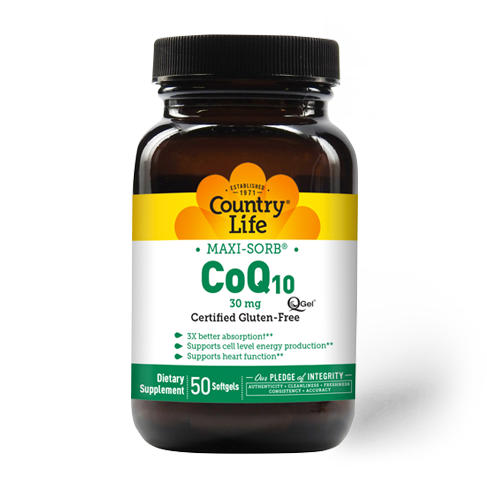
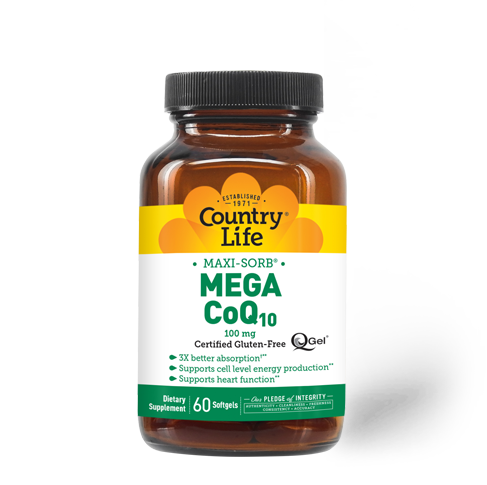
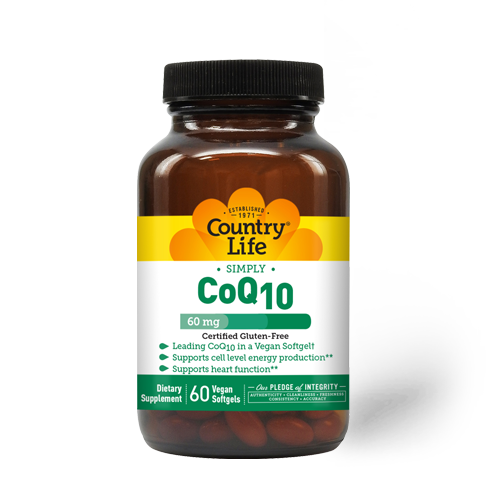
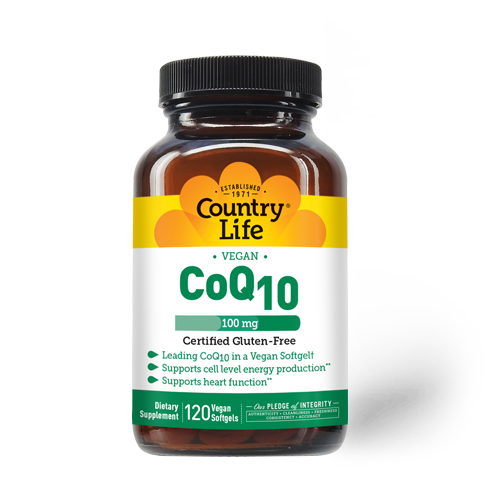
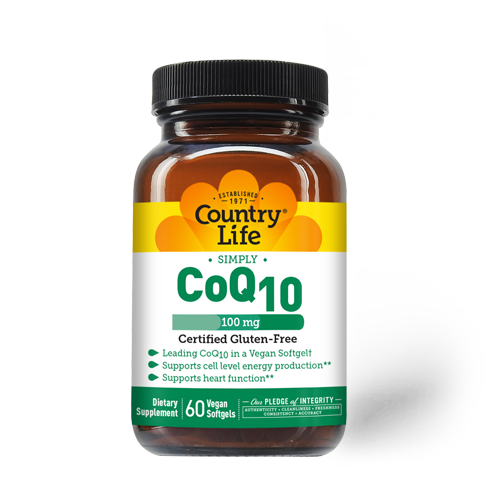
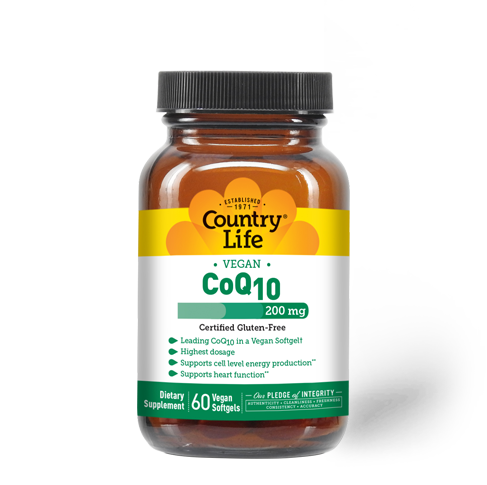










Share:
Do Vitamins Expire?
15 Super Healthy Green Foods + Healthy Meal & Snack Ideas